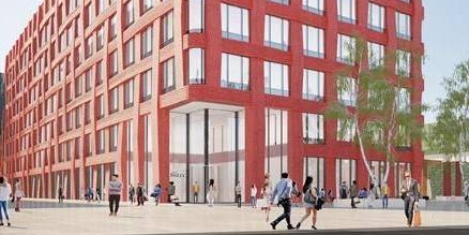March 30, 2018
Agile working driving structural change in New Zealand commercial property
 Technological developments and agile working methodologies are driving significant, structural changes in the requirements for commercial property in New Zealand, according to new research from CBRE. One of these structural shifts is the rise in agile working, which has profound implications for the way office space is used. Unassigned seating is just one aspect of a truly agile business. Activity based working, third party space, coworking and flexibility around the way office space is used and leased are other real estate parts of a wider transformation into an agile organisation.
Technological developments and agile working methodologies are driving significant, structural changes in the requirements for commercial property in New Zealand, according to new research from CBRE. One of these structural shifts is the rise in agile working, which has profound implications for the way office space is used. Unassigned seating is just one aspect of a truly agile business. Activity based working, third party space, coworking and flexibility around the way office space is used and leased are other real estate parts of a wider transformation into an agile organisation.

















 Two new reports published today reflect increasing concerns about stress and mental ill health at work and a lack of understanding by many organisations in how to combat the problem. A new study by Bupa claims that mental health is now a priority at board level for almost two-thirds (65 percent) of businesses, rising to 72 percent among large corporates, while mental health is now a bigger issue than physical illness among employees for nearly a third (29 percent) of businesses. Yet while an overwhelming majority (96 percent) of businesses want to help support their people, many (57 percent) do not know how to best support employees with these challenges. Two in five (39 percent) admit that awareness and understanding of mental health issues is still low across their organisation. These findings are echoed in a report carried out by Perkbox that claims work is by far the most common cause of stress (59 percent). Yet almost one in two (45 percent) of British businesses do not offer anything to help alleviate this, despite the fact that 1 in 4 (25 percent) struggle to be as productive at work when stressed.
Two new reports published today reflect increasing concerns about stress and mental ill health at work and a lack of understanding by many organisations in how to combat the problem. A new study by Bupa claims that mental health is now a priority at board level for almost two-thirds (65 percent) of businesses, rising to 72 percent among large corporates, while mental health is now a bigger issue than physical illness among employees for nearly a third (29 percent) of businesses. Yet while an overwhelming majority (96 percent) of businesses want to help support their people, many (57 percent) do not know how to best support employees with these challenges. Two in five (39 percent) admit that awareness and understanding of mental health issues is still low across their organisation. These findings are echoed in a report carried out by Perkbox that claims work is by far the most common cause of stress (59 percent). Yet almost one in two (45 percent) of British businesses do not offer anything to help alleviate this, despite the fact that 1 in 4 (25 percent) struggle to be as productive at work when stressed.


 It should come as little surprise that graduates who have undertaken an internship are more likely to have honed the skills businesses needs, one of the main findings of the Institute of Student Employers (ISE) annual Development Survey, which launches today (28 March 2018) at the ISE Student Development Conference. The report found that 63 percent of employers believed graduates who had undertaken work experience had the required soft skills, yet less than half (48 percent) thought this of graduates in general. According to the report the five most common graduate skills gaps are; managing up (5 percent of employers believed graduates had this skill); dealing with conflict (12 percent); negotiating/influencing (17 percent); commercial awareness (23 percent and resilience (31 percent). This is why closing skills gaps is a priority for businesses with 74 percent of employers taking specific actions to tackle the issue in 2017. Changes to recruitment and on-the-job training were the most common actions and 16 percent of organisations improved their internship development programmes specifically to close skills gaps.
It should come as little surprise that graduates who have undertaken an internship are more likely to have honed the skills businesses needs, one of the main findings of the Institute of Student Employers (ISE) annual Development Survey, which launches today (28 March 2018) at the ISE Student Development Conference. The report found that 63 percent of employers believed graduates who had undertaken work experience had the required soft skills, yet less than half (48 percent) thought this of graduates in general. According to the report the five most common graduate skills gaps are; managing up (5 percent of employers believed graduates had this skill); dealing with conflict (12 percent); negotiating/influencing (17 percent); commercial awareness (23 percent and resilience (31 percent). This is why closing skills gaps is a priority for businesses with 74 percent of employers taking specific actions to tackle the issue in 2017. Changes to recruitment and on-the-job training were the most common actions and 16 percent of organisations improved their internship development programmes specifically to close skills gaps.
 Almost one in two working age adults currently lack numeracy skills and this skills gap is estimated to cost businesses £3.2bn annually, with a cost to the UK economy of up to £20.2billion a year. This is why charity National Numeracy has joined together with founder supporter, KPMG, to establish the first ever UK National Numeracy Day – created to drive a change in recognition of the importance of numbers, as well as improve employee careers. The day, which takes place on the 16th May will be designed to celebrate numbers, and aims to help individuals to check their numeracy levels, and provide free tools to support improvement amongst those who could benefit. Businesses are being called on to get involved in a variety of ways; from becoming an official supporter, to encouraging employees, suppliers and the local community to check their numeracy levels using the
Almost one in two working age adults currently lack numeracy skills and this skills gap is estimated to cost businesses £3.2bn annually, with a cost to the UK economy of up to £20.2billion a year. This is why charity National Numeracy has joined together with founder supporter, KPMG, to establish the first ever UK National Numeracy Day – created to drive a change in recognition of the importance of numbers, as well as improve employee careers. The day, which takes place on the 16th May will be designed to celebrate numbers, and aims to help individuals to check their numeracy levels, and provide free tools to support improvement amongst those who could benefit. Businesses are being called on to get involved in a variety of ways; from becoming an official supporter, to encouraging employees, suppliers and the local community to check their numeracy levels using the 


 Over a fifth (21 percent) of 18-24 year olds admit that they have rejected a potential employer because of the poor design of the office or lack of amenities available, while 34 percent in the same age group would be willing to commute for a maximum of one hour each way to an office that is considered perfect – compared to 22 percent of 45-54 year olds. The research, commissioned by Mindspace, found that 16 percent of 18-24 year olds have actually left a job because of how poorly designed the office was in one of their previous roles. Overall, nearly a third (31 percent), of workers are bored with their current office environment and feel uninspired at work, with 28 percent of workers describing their place of work outdated and dull. The research also found that while most workers had access to amenities such as a kitchen (72 percent), meeting rooms (66 percent) and free tea & coffee (53 percent), what UK office workers desire the most to improve morale is more natural light, air conditioning and improved interior lighting.
Over a fifth (21 percent) of 18-24 year olds admit that they have rejected a potential employer because of the poor design of the office or lack of amenities available, while 34 percent in the same age group would be willing to commute for a maximum of one hour each way to an office that is considered perfect – compared to 22 percent of 45-54 year olds. The research, commissioned by Mindspace, found that 16 percent of 18-24 year olds have actually left a job because of how poorly designed the office was in one of their previous roles. Overall, nearly a third (31 percent), of workers are bored with their current office environment and feel uninspired at work, with 28 percent of workers describing their place of work outdated and dull. The research also found that while most workers had access to amenities such as a kitchen (72 percent), meeting rooms (66 percent) and free tea & coffee (53 percent), what UK office workers desire the most to improve morale is more natural light, air conditioning and improved interior lighting.







